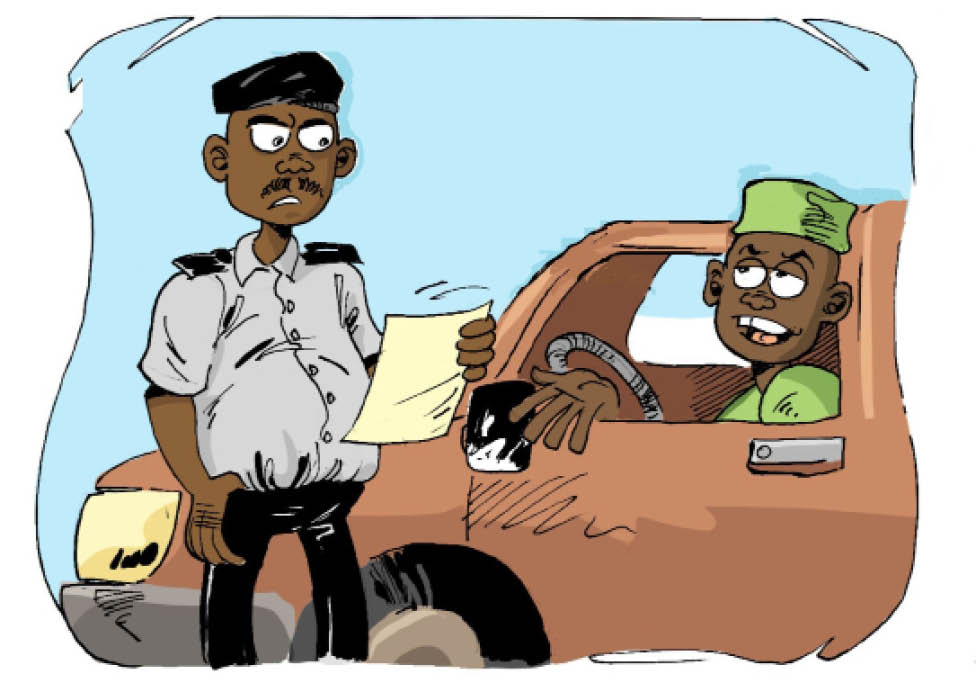Column No.6: Uniformed, yet uninformed
First, we have the actual armed forces, all three arms of it: The Army, Navy and Air Force. Then we have the Police Force, the DSS, Customs, Immigration

Uniformed, yet uninformed
“Oga I be force man,” asserted the young man after I asked him about the uniform he wore. It was in traffic, around a market, and it was brownish, complete with lanyard and a nametag that had the Nigerian flag. He also sported a nametag, and wore boots and anklets around his shin. You know, looking all military. But he isn’t, as I confirmed for myself when I looked at the right side of his chest, where I saw ‘AMAC Marshal’ boldly embroidered. Any Abuja resident knows AMAC to be an acronym for Abuja Municipal Area Council, which covers the city itself. I thought it was weird, so I looked it up.
It turned out that the AMAC Marshals were created after a traffic control task force was accused of high-handedness. Council Chairman Abdullahi Adamu Candido then described the Marshals as “a guard company owned by the council”, adding that they will be well-trained. But if a friend’s experience with them is any indication, then that’s far from the reality. But that’s for later. As I drove away from ‘Mr. Force Man’ – as uniformed as possible about his own job – I pondered on many things, including his combat-ready outfit, the heightening militarisation of the most unnecessary things around us, as well as a dizzying array of uniformed ‘services’.
- SON seizes N600m worth of substandard tyres
- My prayer is to have a right marriage not just a beautiful wedding – Morell
First, we have the actual armed forces, all three arms of it: The Army, Navy and Air Force. Then we have the Police Force, the DSS, Customs, Immigration, Civil Defence Corps, and the Correctional Service, all rightfully wearing uniforms. There also are the Federal Road Safety Corps, and the VIO, also quite essentially spruced up in uniforms. Then add to the mix the Peace Corps. While you’re at it, don’t forget the rather newly-minted Amotekun, and the upcoming Ebube Agu. There also are various uniformed officials in many states across the nation, controlling traffic and even arresting offenders. In all of it – this proliferation of uniforms all over – one would think it would translate into better security. The truth is it doesn’t.
Do you think I’ve listed all the ‘uniforms’? You’re wrong. There’s the confusing ‘vigilante’, and I say so because vigilantism by its very definition is illegal. Members of the group proudly declare themselves ‘vigilantes’, totally uninformed about what it means. There also is the collective called ‘Yan Banga’, for which I have no translation from Hausa, but are generally self-help groups which slightly resemble the ‘vigilante group’. They, too, are uniformed!
The staggering number of uniformed ‘services’, including paramilitary and others, are enough to make someone dizzy, and it would practically be sadistic if their number were to be asked as an exam question, if Social Studies still existed that is. At the risk of digressing, it should also be noted that even within some of the uniformed services, there’s a trend I’ve noticed, of many uninformed personnel who haven’t trained for it, but wear t-shirts that say ‘Special Forces’.
But let’s go back to the AMAC Marshals though, as I promised, with my friend’s account of his encounter with them. My friend – let’s call him Sadeeq – said he was driving within Utako, and was about to get onto the highway by the popular Zankli Hospital, when he began to feel dizzy. He immediately parked as soon as he could clear, which was after the rather chunky pedestrian bridge nearby. As he caught his breath, an old unmarked vehicle swerved roughly in front of him and parked, as three AMAC Marshals jumped out. One came to his side to talk to him, while the others went to the right side and tried to aggressively gain entry into his car. The doors were locked, of course. It took a 20-minute explanation that he wasn’t feeling well, before they drove off without even offering help of any kind.
Not my words, but Sadeeq described their conduct as being “high-handed”, while they came across as “uninformed” about service. Regular citizens like ‘corporate security’ and market parking officials are all sporting uniforms, abusing it with unbelievable levels of highhandedness (that word again). The mania is all-encompassing, that even vile criminals like terrorists kill, rape, kidnap, and pillage while wearing uniforms. The craze for uniforms – boots, and all – underscores the average Nigerian’s thirst for power, even without earning it. Honestly, the armed forces, as well as the other services that legit need and wear uniforms, deserve respect.
Maybe the Minister of the Interior, Alhaji Abdulrauf Aregbesola, should borrow a leaf from his predecessor, retired General Abdulrahman Dambazau, who at a time spearheaded the streamlining of the uniforms of the armed forces to a single type of camouflage, only differentiated by each arm’s unique accoutrements. The current minister, honestly, should introduce measures aimed at controlling uniforms, how they are worn, and by whom. So nobody is uninformed. If it’s for identification, other distinctly non-military uniforms can be used by non-armed forces, security, or official personnel, so there’s no confusion of any sort. After all, ‘Khaki,’ as they say, ‘No be leather.’
